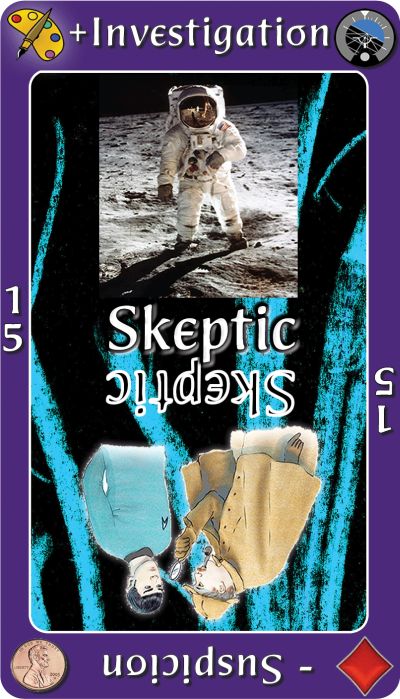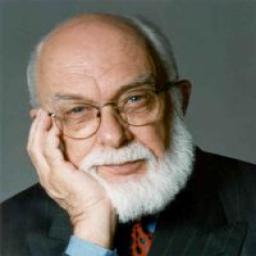15 Skeptic

“Fascinating!”
A phrase of engaged attention by the character of Mr. Spock, in Star Trek
Symbols & Color
- Artist’s palette: Symbol of the Artisan Set
- Attitude Gauge: Symbol of the Attitudes Group
- Penny: Symbol of Ordinality – Personal and intimate
- Diamond: Icon for the Expressive Overleaves
- Border Color: Violet – Artisan Set
Implications for the Upright Position or Positive Pole
‘How can you ever know anything, unless you check it out?’ Well, it was that attitude that landed Apollo 11 on the Moon! For almost a decade, scientists and engineers investigated the possibility, thought about the requirements, and from those created a design and plan, leading them to accomplish one of human kinds greatest achievements. Investigation, means focusing your attention on the question “how possible is it?” Then follow up with “let’s put it to the test!”
Card messages in the Illuminated position.
+ Investigation
(Curious, questioning, pondering, due-diligence, specific, detailed, monitoring, hypothesis)
- Healthy questions always reveal deeper truths! Investigation challenges the mind to expand not contract. What is being asserted that causes you to question?
- “It might be” and the thought spurs the investigation of the explorer. Now is the time to let questions, rather than answers, guide you.
- You are amazing in what you are hypothesizing. Now, can you design a model of how your idea might work?
- Investigation challenges the mind to expand while forcing it to contract the possible explanations. This is the power of logic and reason. Use these, not a hunch nor a feeling. Be thorough.
- Science is founded on the reasoned position to question one’s assumptions. Be rigorous in your investigation like a detective solving a case.
- Put your assumptions to the test. Clarity results when light is shed into the darkness.
- Thoughtful questions always reveal better answers! Don’t doubt yourself or your intention so much as your belief that you have all the answers. No one does!
- It is a good bet! You’ve done your research, learned the facts, and now it is time to introduce them into the discussion. Whoever doesn’t stumble here is likely to win the day. Even if it is on logic alone.
- Clarity results when light is shed into the darkness, but also when an assumption is being put to the test. If the proposition is solid, it will stand a few stress tests. Do it!
- “The test of a first-rate intelligence is the ability to hold two opposed ideas in mind at the same time and still retain the ability to function.” Said F. Scott Fitzgerald. Find middle ground.
- Go ahead and be suspicious. Don’t trust the assertions of the ruling paradigms. Even a broken clock is right twice a day. Gather facts.
- Instead of tearing something down, see if you can build something else up?
Quotes signifying the Overleaf in this pole
- “Every person who has mastered a profession is a skeptic concerning it.” George Bernard Shaw
- “The wise skeptic does not teach doubt but how to look for the permanent in the mutable and fleeting.” Ralph Waldo Emerson
- “Skeptical scrutiny is the means, in both science and religion, by which deep insights can be winnowed from deep nonsense” Carl Sagan
Implications of the Reversed Position or Negative Pole
Imagine two of the world’s most famous “doubting Thomas’s” meeting each other but having opposing views. Spock and Sherlock Holmes, coming from different times and enabled with different technologies, could certainly view each other at first, with suspicion. Yet, the rigor that goes along with the skeptic attitude, might lead them to realize that they are still approaching each other using the same intellectual frame of reference.
Card messages in the Shadow position.
+ Suspicion
(Argumentative, doubting, distrusting, enigmatic, undermining, exacting, diminishing, minimizing, interrogating, dismissive, heady, nihilist, sinister, dissection)
- Without trust, there is only suspicion. Good will is lost when you believe the other is lying. Rather than a search for discovery, accuracy or validation, the ruling motive of the shadow skeptic is to discredit. Is their doubt clouding your desire to know the truth? Confront the obvious limitations of fact.
- Wavering on a decision? What are you suspicious of? Don’t stop yourself by not asking the question.
- Don’t believe everything your think! Skeptics question assumptions. but is fear making you suspicious instead of curious?
- Due diligence is required. Nothing goes unexamined. And, no one gets a free pass.
- What is being asserted that is causing you to question? Is it about the idea or your own beliefs that might be in doubt?
- Thoughtful questions always reveal better answers. Don’t doubt yourself or your intentions; but let yourself be skeptical of the belief that you already possess all the answers. No one does!
- Wavering on a decision? What are you suspicious of? Don’t stop from asking the question.
- ‘Curiosity killed the cat.’ That assumes that the cat was merely distracted instead of aware of what was going on around him. Be the nice kitty and don’t look suspicious as you check things out.
- Being skeptical is NOT the same as being cynical. The former says “let’s find out” the second says “there’s not point.” This contrast bears investigation, not being a grumpy bear.
- Good science says ‘begin with doubt, then test thoroughly.’ This can be a terrific way to research. It might be a very stifling way to live.
- Being Skeptical is not the same as being Cynical. The former says ‘let’s find out’, the second says ‘there’s no point’. This idea bears investigation, not being a grumpy bear.
- “Curiosity killed the cat.” That assumes that the cat was merely distracted instead of being aware of what was going on around him. Be the nice kitty and don’t look suspicious.
- . Use inductive reasoning. You might otherwise miss a few things.
- Do you feel as if you’ve just been interrogated? Rather than try to qualify every answer, state your principles simply and clearly. If you can’t, then maybe you should be suspicious of your own motives?
- Rather than a search for discovery, accuracy or validation, the ruling motive of the shadow skeptic is to discredit. Is their doubt clouding your desire to know the truth? Confront the obvious limitations of fact.
Quotes signifying the Overleaf in this pole
- “A skeptic is a person who would ask God for his ID card.” Edward Shaoff
- “The solemn scepticism of science has replaced the sneering doubts of witty philosophers. The more positive knowledge we gain, the more we incline to question all that has been received without absolute proof.” Oliver Wendell Holmes
- De omnibus dubitandum. “All is to be doubted.” Rene Descartes
- “Science deals [with nature], the only reality of which we have any certain knowledge…Those fundamentalist[s]…who speak contemptuously of science…reveal an astonishing insensitivity to the very world they tell us God created. Granting, then, our prior assumption of a Creator, anyone who criticizes real science is in a direct sense criticizing God.” Steve Allen
Relevance within the Michael Teaching

Of all of the Attitudes, the Skeptic has the most active mind, but not blindly accepting. Some would say this of the Realist but by contrast, he/she must have the most open eyes. They put ideas to the test with intention to find greater accuracy and truth. While the Skeptic questions everything and the Idealist believes in an all encompassing place for everything. When a soul chooses this Attitude, you can rest assured the like the WHO song, “We Don’t Get Fooled Again” is primary on their mind. Credibility of source is a important to the Skeptic; but even then it might not carry the day in persuading them to accept someone else’s proposition. Their focus is somewhat inward, like they are calculating probability.
In contrast to their paired complement, the Idealist who tends to accept ideas at face value; the Skeptic will take the opinion “it might be” and proceed to probe for more information. A Skeptic can have faith in an idea that might seem irrational, especially in the younger Soul Ages. The criteria however must be something that they have rationalized and tend to agree with some world view they already adhere to.
The eyes and eyebrows are particularly featured in the Skeptic, as if studying what is before them. Skeptics often have a look of distrust about them, even a slight scowl. Like Growth, they can have a lined face and furrows on the forehead. However, unlike Growth, the attitude of Skeptic will appear to always be probing for more information to study you so that the lines are that of focus and/or worry. Even though Skeptics do smile, their more natural expression is one of pondering and thinking intensely, this is their natural facial repose.
Famous Skeptics
Socrates, George Bernard Shaw, Mr. Spock, Renee Descartes, William F. Buckley, Bertrand Russell, Cher, Justin Timberlake, Steve Allen, Woody Allen, George Burns, Leonardo DaVinci, Paul Hogan, Meryl Streep, Glenn Close, Mike Wallace, James Burke, Truman Capote, Chevy Chase, Sean Connery, Rodney Dangerfield, Bob Dylan, Thomas Edison, Harrison Ford, Sigmund Freud, Pee Wee Herman, Bette Midler, Diane Sawyer, William Shakespeare, George Harrison, Candice Bergen
Cultural Relevance
The scientific method is the epitome of the Skeptic Attitude. Substantive questions and a willingness to know the facts before completely forming an opinion is the hallmark of a positivistic (to know more) skepticism. An entire school of Philosophy grew from this Attitude with the central premise underlying is a relativistic view of knowledge; that truth is only possible within a range of awareness because not all things can be known or certain. Thus, this Attitude besides being the one that pervades scientific thought is also favored by investigators in law, journalism, and police work. In fact, the entire American system of justice is based upon a related idea: “reasonable doubt.” And instead of innocent until proven guilty, the mechanism in life tends to be reversed, wrong until proven correct.
Because the Skeptic may be strict in his evaluation, this might easily give rise to a person who is unwilling to take a definitive position on anything. Cautious not to be assailed by those who might have a position that might trump their own, this Attitude is prominent in the world of politics and can be heard as vague generalizations from Press Secretaries of any major holder of power. So-called “activist Skeptics” or debunkers tend to be Cynics.
You might Have the Attitude of Skeptic if…
- Even when being polite, you tend to have an inner voice saying “I’ll check this out to verify it.”
- When confronted some declaration of another or by a advertisement, “prove it” or “show me a demonstration” is your credo.
- A person is automatically makes you suspicious when they have too much exuberance or enthusiasm for something.
- Your willing to take someone’s word as long as you know they are credible about which they speak.
- Taking things at “face value” is not your style.
by Stephen Cocconi © 2011, Updated 2024
For a Motivations Cards Reading or Channeled Consultation call: 209.768-4956 or email Stephen at channeling@themichaelteaching.com

